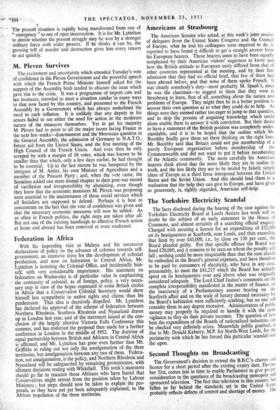M. Pleven Survives .
The excitement and uncertainty which attended Tuesday's vote of confidence in the Pleven Government and the powerful speech with which the French Prime Minister himself asked for the support of the Assembly both tended to obscure the issue which gave rise to the crisis. It was a programme of import cuts and tax increases, intended to meet a situation similar in many ways to that now faced by this country, and presented to the French Assembly by a Government which has always underlined the need to curb inflation. It is unlikely that any deputy in his senses failed to see either the need for action or the moderate nature of the measures themselves. Yet to get his majority M. Pleven had to point to all the major issues facing France in the next few weeks—disarmament and the Moroccan question in the General Assembly, the admission of Germany to N.A.T.0„ future aid from the United States, and the first meeting of the High Council of the French Union. And eNTi then he only scraped by with a margin of 18 votes, which was known to be smaller than that which, only a few days earlier, he had thought to be essential. Up to the lastminute he was hampered by the intrigues of M. Antier, his own Minister of Agriculture and a member of the Peasant Party ; and, when the vote came, the Socialists added one more dismal chapter to their post-war record of vacillation and irresponsibility by abstaining, even though they knew that the economic measures M. Pleven was proposing were essential to the maintenance of those social services which all Socialists are supposed to defend. Perhaps it is best to concentrate on the fact that the vote of confidence was given and that the necessary economic measures will now be tabled. As so often in French politics, the right steps are taken after all. But not one of the existing handicaps to effective French action at home and abroad has been removed or even weakened.


































 Previous page
Previous page